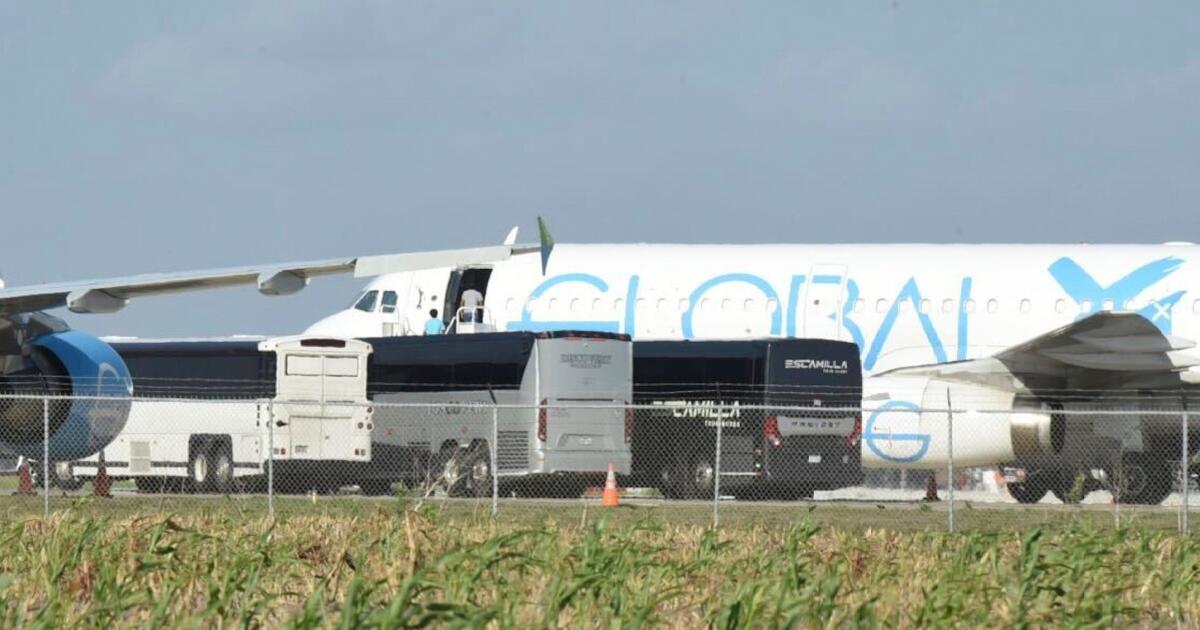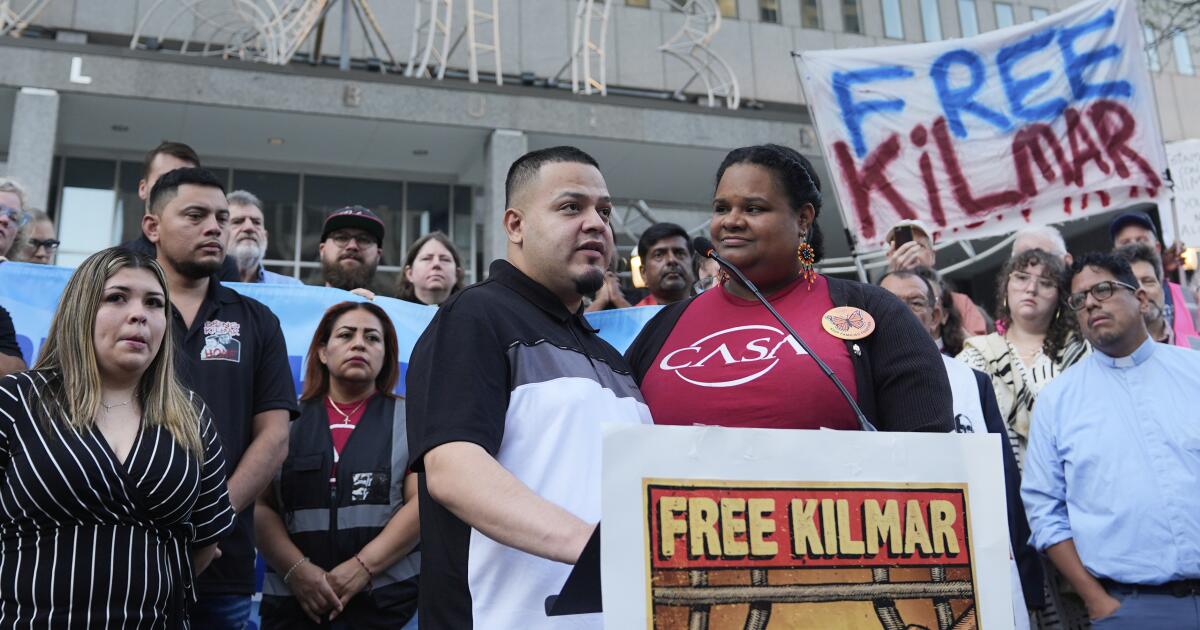Federal judge bars U.S. government from sending Guatemalan children back, for now
HARLINGEN, Texas — A U.S. judge at least temporarily blocked the government Sunday from deporting a group of Guatemalan children who had crossed the border without their families, after their lawyers said the youngsters were loaded onto planes overnight in violation of laws affording protections for migrant kids.
Attorneys for 10 Guatemalan children, ages 10 to 17, said in court papers filed late Saturday that there were reports that planes were set to take off within hours for the Central American country. But a federal judge in Washington said those children couldn’t be deported for at least 14 days, and after a hastily scheduled hearing Sunday, she emphasized that they needed to be taken off the planes and back to the Office of Refugee Resettlement facilities while the legal process plays out.
“I do not want there to be any ambiguity,” said Judge Sparkle L. Sooknanan, who said her ruling applies broadly to Guatemalan minors who arrived in the U.S. without their parents or guardians.
Government lawyers, meanwhile, maintained that the children weren’t being deported but rather reunited at the request of their parents or guardians — a claim that the children’s lawyers dispute, at least in some cases.
Similar emergency requests were filed in other parts of the country as well. Attorneys in Arizona and Illinois asked federal judges there to block deportations of unaccompanied minors, underscoring how the fight over the government’s efforts has quickly spread.
Immigrant advocates react
The episode has raised alarms among immigrant advocates, who say it may represent a violation of federal laws designed to protect children who arrive without their parents. While the deportations are on hold for now, the case underscores the high-stakes clash between the government’s immigration enforcement efforts and the legal safeguards that Congress created for some of the most vulnerable migrants.
At the border-area airport, the scene Sunday morning was unmistakably active. Buses carrying migrants pulled onto the tarmac as clusters of federal agents moved quickly between the vehicles and waiting aircraft. Police cars circled the perimeter, and officers and security guards pushed reporters back from the chain-link fences that line the field. On the runway, planes sat with engines idling, ground crews making final preparations as if departures could come at any moment — all as the courtroom battle played out hundreds of miles away in Washington.
Shaina Aber of Acacia Center for Justice, an immigrant legal defense group, said it was notified Saturday evening that an official list had been drafted with the names of Guatemalan children whom the U.S. administration would attempt to send back to their home country. Advocates learned that the flights would leave from the Texas cities of Harlingen and El Paso, Aber said.
She said she’d heard that federal Immigration and Customs Enforcement officials “were still taking the children,” having not gotten any guidance about the court order.
The Department of Homeland Security, Immigration and Customs Enforcement, and the Department of Health and Human Services did not immediately respond to requests for comment on Sunday.
Plans to remove nearly 700 Guatemalan children
The Trump administration is planning to remove nearly 700 Guatemalan children who came to the U.S. unaccompanied, according to a letter sent Friday by Sen. Ron Wyden of Oregon. The Guatemalan government has said it is ready to take them in.
It is another step in the Trump administration’s sweeping immigration enforcement efforts, which include plans to send a surge of officers to Chicago for an immigration crackdown, ramping up deportations and ending protections for people who have had permission to live and work in the United States.
Lawyers for the Guatemalan children said the U.S. government doesn’t have the authority to remove the youngsters and is depriving them of due process by preventing them from pursuing asylum claims or immigration relief. Many have active cases in immigration courts, according to the attorneys’ court filing in Washington.
Although the children are supposed to be in the care and custody of the Office of Refugee Resettlement, the government is “illegally transferring them to Immigration and Customs Enforcement custody to put them on flights to Guatemala, where they may face abuse, neglect, persecution, or torture,” argues the filing by attorneys with the Young Center for Immigrant Children’s Rights and the National Immigration Law Center.
An attorney with another advocacy group, the National Center for Youth Law, said the organization started hearing a few weeks ago from legal service providers that agents from Homeland Security Investigations — ICE’s investigative arm — were interviewing children, particularly from Guatemala, in Office of Refugee Resettlement facilities.
The agents asked the children about their relatives in Guatemala, said the attorney, Becky Wolozin.
Then on Friday, advocates across the country began getting word that their young clients’ immigration court hearings were being canceled, Wolozin said.
Migrant children traveling without their parents or guardians are handed over to the Office of Refugee Resettlement when they are encountered by officials along the U.S.-Mexico border. Once in the U.S., the children often live in government-supervised shelters or with foster care families until they can be released to a sponsor — usually a family member — living in the country.
The minors can request asylum, juvenile immigration status or visas for victims of sexual exploitation.
Due to their age and often traumatic experiences getting to the U.S., their treatment is one of the most sensitive issues in immigration. Advocacy groups already have sued to ask courts to halt new Trump administration vetting procedures for unaccompanied children, saying the changes are keeping families separated longer and are inhumane.
Guatemala willing to receive the unaccompanied minors
Guatemalan Foreign Affairs Minister Carlos Martínez said Friday that the government has told the U.S. it is willing to receive hundreds of Guatemalan minors who arrived in the U.S. unaccompanied and are being held in government facilities.
Guatemala is particularly concerned about minors who could pass age limits for the children’s facilities and be sent to adult detention centers, he said.
President Bernardo Arévalo has said that his government has a moral and legal obligation to advocate for the children. His comments came days after U.S. Homeland Security Secretary Kristi Noem visited Guatemala.
Gonzalez and Santana write for the Associated Press and reported from Harlingen and Washington, respectively. AP writers Jennifer Peltz in New York and Corey Williams in Detroit contributed to this report.

